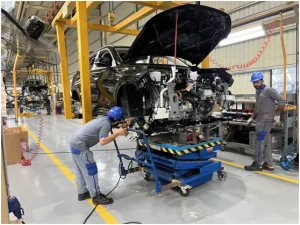An Orange Line metro train pulls into a terminal station in Lahore, Pakistan, November 1, 2020. /CGTN Wang Tianyu.
When we were driving into the city of Lahore in Pakistan, my driver pointed out an orange metro train speeding across the tracks above us and said: “This line was built by the Chinese.”
I, as a Chinese journalist, while flattered, more so embarrassed since I didn’t know much about the rapid transit line. I quickly looked it up and these were some of the things I learnt:
The Orange Line is Pakistan’s first metro service. It runs through 26 stations – 24 elevated, 2 underground, spanning 27.1 kilometers. Financed by the Export–Import Bank of China, construction work, undertaken by Pakistani companies, began in October 2015. The trains, rolled out by Chinese electric locomotive manufacturer CRRC Zhuzhou Locomotive, started operation in October 2020.
Under the grand scheme of things, I realized I shouldn’t beat myself over missing a few facts. Chinese influence is so widespread in Pakistan, especially after the announcement of the China-Pakistan Economic Corridor (CPEC) in 2013.
The CPEC is a pilot project of the largerBelt and Road Initiative (BRI), launched later in the same year. Through the project, regional connectivity has undoubtably been strengthened.The two countries have agreed to develop together so that greater benefits can be provided forthe people.
Through my own eyes, I saw Chinese-invested power plants generating electricity in Pakistan,for Pakistan. Local manufacturers importauto parts from China and assemble Chinese-branded automobiles, such as BAIC, SAIC and GWM, which are favored by local dealerships. Chinese electronic products and home appliances, like Xiaomismartphones, Haier TVs and Gree air conditioners, appeared in every place I visited.

Workers of Sazgar Engineering assemble Chinese car model Haval H6 in Lahore, Pakistan, August 29, 2023. /Wang Tianyu
According to China’s National Development and Reform Commission, China has been Pakistan’s largest trading partner since 2015. In 2022, bilateral trade reached $26.5 billion.
The cooperation goes far beyond trade. More importantly, it lies in infrastructure development.
Alaiza Farid, a second-year college student studying Governance and Public Policy at the School of Integrated Social Sciences atthe University of Lahore, told me China has given her country “development that Pakistan needs.”
The example she gave was the Quaid-e-Azam Solar Plant in Punjab province, Pakistan’s first solar power plant, which was built by China’s Tebian Electric Apparatus. The solar power park contributes to solving Pakistan’s power shortage and lack of renewable energy investments.
“When a lot of countries consider Pakistan to be this third-world country and aren’t willing to support us, China is one of those countries that have always helped us when no one else would,” said Farid.
There is a long history of friendship between China and Pakistan. In China, there is even a special term to describe Pakistanis, that is “Ba Tie,” which translates as “Iron Brothers.”
From my solid handshakes with our “Iron Brothers”, I can tell that this friendship will only become stronger.










